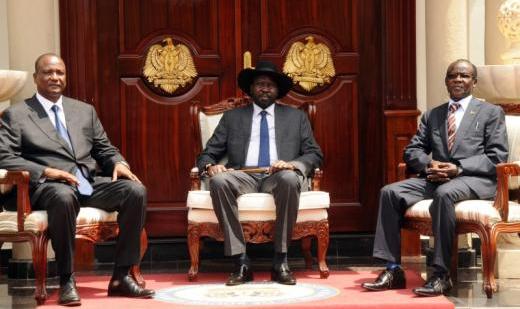IGAD moves to recognize Gai as new S. Sudan Vice President

August 27, 2016 (JUBA) – Regional countries that negotiated South Sudanese shaky peace agreement have signalled recognizing controversially appointed new First Vice President Taban Deng Gai according to media reports.
The Intergovernmental Authority on Development (IGAD) said Gai is “naturally accommodated” by provisions of the Agreement to Resolve Conflict In Republic of South Sudan (ARCSS). The agreement gave position of first Vice President to SPLM in opposition leader Riek Machar. Machar fled was sworn in April but fled Juba in Juba when his bodyguards clashed with thousands of soldiers loyal to President Slava Kiir.
In an email message to the press on Friday, Sharon Kuku, a spokesperson for the IGAD states, said that the decision by Juba to replace Machar has never being rejected by IGAD.
“[This decision] is naturally accommodated by IGAD and IGAD did not stop Gen. Deng from attending the summit nor speaking for the South Sudan government,” said Kuku as quoted by Kenyan independent newspaper, Nation.
IGAD statement is the second such utterance after the United States Secretary of State John Kerry told reporters in Nairobi on Monday that Machar replacement is “legal” under the provisions of the peace accord.
The top U.S diplomat’s statement was echoed by State Department spokeswoman on Friday in Washington.
US State Department spokeswoman Elizabeth Trudea said that ”the [peace] agreement provides the top leadership of the armed opposition the power to nominate a new first vice president if that position is vacant.”
Machar supporters said the replacement is illegal and insist that Gai is an illegal First Vice President.
But Machar’s silence, after exiting South Sudan to Democratic Republic of Congo and being hospitalized in Khartoum, Sudan last week, is fuelling speculations that he is not capable of making his comeback in politics.
Analysts say the diplomatic change of position is attempt to persuade Juba to allow United Nations Security Council-authorized 4,000 troops to be allowed deployment in Juba. The government has rejected the extra troops, claiming it’s an attempt to effect regime change. But president Kiir has since softened his stance rejection to the force.
(ST)
